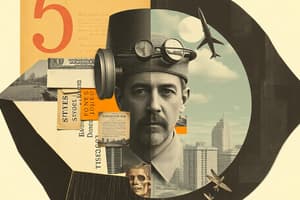Podcast
Questions and Answers
What does Henry Ford suggest as the real source of security?
What does Henry Ford suggest as the real source of security?
- Relationships
- Family connections
- Financial assets
- Knowledge, experience, and ability (correct)
How does Uncle Cleve's driving style reflect his personality?
How does Uncle Cleve's driving style reflect his personality?
- He drives fast to keep up with others.
- He drives slowly as a form of arrogance.
- He is indifferent to other drivers.
- He drives slowly, demonstrating thoughtfulness. (correct)
What was the routine that Clifton followed at the Ice House?
What was the routine that Clifton followed at the Ice House?
- Only working when customers were present.
- Ending the day with a payment through delivery.
- Knowing how the day would proceed from start to finish. (correct)
- Completing work more quickly than expected.
How does Clifton perceive Uncle Cleve's approach to life?
How does Clifton perceive Uncle Cleve's approach to life?
What action does Clifton take after counting the day's receipts with Uncle Cleve?
What action does Clifton take after counting the day's receipts with Uncle Cleve?
What lesson did Uncle Cleve emphasize about spending money?
What lesson did Uncle Cleve emphasize about spending money?
How did Uncle Cleve view his friends who spent their money quickly?
How did Uncle Cleve view his friends who spent their money quickly?
What did Uncle Cleve say about the relationship between saving money and borrowing?
What did Uncle Cleve say about the relationship between saving money and borrowing?
What was Uncle Cleve's approach to his possessions, like his shoes and truck?
What was Uncle Cleve's approach to his possessions, like his shoes and truck?
What did Uncle Cleve mean by saying, 'money’s like grease. It’ll sho run right outta yor hand if you don’t squeeze it tight'?
What did Uncle Cleve mean by saying, 'money’s like grease. It’ll sho run right outta yor hand if you don’t squeeze it tight'?
What advice did Uncle Cleve give regarding saving money?
What advice did Uncle Cleve give regarding saving money?
How did Uncle Cleve view his financial situation compared to others?
How did Uncle Cleve view his financial situation compared to others?
What was Uncle Cleve's attitude towards financial temptations?
What was Uncle Cleve's attitude towards financial temptations?
What was the initial financial experience of the narrator before learning from Uncle Cleve?
What was the initial financial experience of the narrator before learning from Uncle Cleve?
What did Uncle Cleve prioritize over the opinions of others?
What did Uncle Cleve prioritize over the opinions of others?
How did Uncle Cleve's past experiences influence his banking behavior?
How did Uncle Cleve's past experiences influence his banking behavior?
How did the narrator feel after making their first bank transaction?
How did the narrator feel after making their first bank transaction?
What mindset did Uncle Cleve instill in the narrator about earning money?
What mindset did Uncle Cleve instill in the narrator about earning money?
What motivated the narrator to save money and avoid unnecessary spending?
What motivated the narrator to save money and avoid unnecessary spending?
How did the narrator feel about buying a new suit compared to wearing surplus clothing?
How did the narrator feel about buying a new suit compared to wearing surplus clothing?
What was the narrator's attitude toward the opinions of others who called them cheap?
What was the narrator's attitude toward the opinions of others who called them cheap?
What lesson did the narrator take from Uncle Cleve regarding spending money?
What lesson did the narrator take from Uncle Cleve regarding spending money?
Which of the following best describes the narrator's experience with banking in their youth?
Which of the following best describes the narrator's experience with banking in their youth?
What did the narrator and their wife achieve through their involvement in the investing group?
What did the narrator and their wife achieve through their involvement in the investing group?
How did the narrator view their path to a career in banking later in life?
How did the narrator view their path to a career in banking later in life?
Flashcards are hidden until you start studying
Study Notes
Clifton's Ice House Memories
- The author had a profound influence from his uncle, Cleve, who valued saving money over spending it
- Cleve taught him the value of money and saving.
- Cleve was a successful businessman who started from humble beginnings and invested his earnings wisely
- Cleve's philosophy was to save money and invest it in his future, rather than spending it on unnecessary things or impressing others.
- Cleve had a methodical way of approaching life and was not swayed by the opinions of others when it came to his finances.
- Despite being called cheap by many, Cleve never had to borrow money, even when others around him were struggling financially.
- Cleve's approach to life was deliberate, and he was always looking for ways to improve his future.
Cleve's School of Finance
- Cleve's lessons focused on the importance of saving money and seeing it as an investment in the future.
- Cleve taught his nephew to prioritize saving over spending, even when others around him were spending every penny they earned.
- Cleve had a firm belief in saving and using money wisely.
- He frequently reminded his nephew to be mindful of his spending and avoid unnecessary purchases.
- Cleve used his own life as an example, demonstrating the importance of saving by having a modest lifestyle.
Practical Applications
- Though he lived modestly, Cleve had a secure financial foundation built through savings, enabling him to invest in real estate.
- Cleve did not see the need to impress others with his wealth through extravagant spending. He prioritized long-term financial security over immediate gratification.
- He was willing to fix and maintain his truck for years rather than buy a new one, allowing him to save money.
- Cleve saw the value in being financially independent, as it meant being free from debt.
The Impact on the Author
- The author adopted his Uncle Cleve's approach to saving money and invested his first paycheck in a savings account.
- The author valued his passbook as a symbol of financial growth, mirroring his uncle's perspective on financial security.
- The author's friends teased him for being "cheap," but he prioritized saving money over spending it on unnecessary things.
- The author's confidence grew as he built his savings, demonstrating the power of his Uncle Cleve's influence.
- The author eventually bought himself a new suit, but only after he felt financially stable and secure.
- He continued his Uncle Cleve's legacy of saving money and investing in his future even after joining the Air Force and starting a family.
- The author's financial success was built on the foundation of saving money he learned from his Uncle Cleve.
Beyond The Status Quo
- The author's experiences with banking, first with his Uncle Cleve and later in his own career, highlighted his desire to break free from the limitations imposed upon Black professionals at the time.
- His career as a bank graduate studies program participant, and later in the banking industry, displayed his dedication to personal and professional growth.
- The author's pursuit of a career in banking demonstrated his aspiration to contribute to a sector that had historically excluded Black professionals.
- The author's success in banking, despite the challenges faced by minorities in that industry, proved the value of his Uncle Cleve's lessons and his own determination.
- Cleve's legacy of financial prudence and strategic planning played a critical role in shaping the author's life and career.
Becoming an Entrepreneur
- The key to creating wealth comes from understanding and applying the concept of increasing income while decreasing expenses.
- Entrepreneurs focus on using money as a tool, rather than a measure of status.
Avoiding the Trap of Spending
- Focus on solving problems for others, rather than trading time for money, this is the approach of entrepreneurs.
- Successful entrepreneurs aim for future-focused goals and are willing to make sacrifices to achieve them.
- Empowering entrepreneurs understand that the more people they can reach, the more problems they can solve, and the more money they can earn.
- Learning about money is a key aspect of wealth creation, but it is not the only factor; mindset plays a crucial role.
The Importance of Shifting Mindsets
- Avoid spending money on things that merely create the appearance of wealth.
- Many successful entrepreneurs use their time and money for creating solutions.
- Do not fall into the trap of increasing spending as income rises.
- The key to success is shifting awareness and changing behavior.
Studying That Suits You
Use AI to generate personalized quizzes and flashcards to suit your learning preferences.




